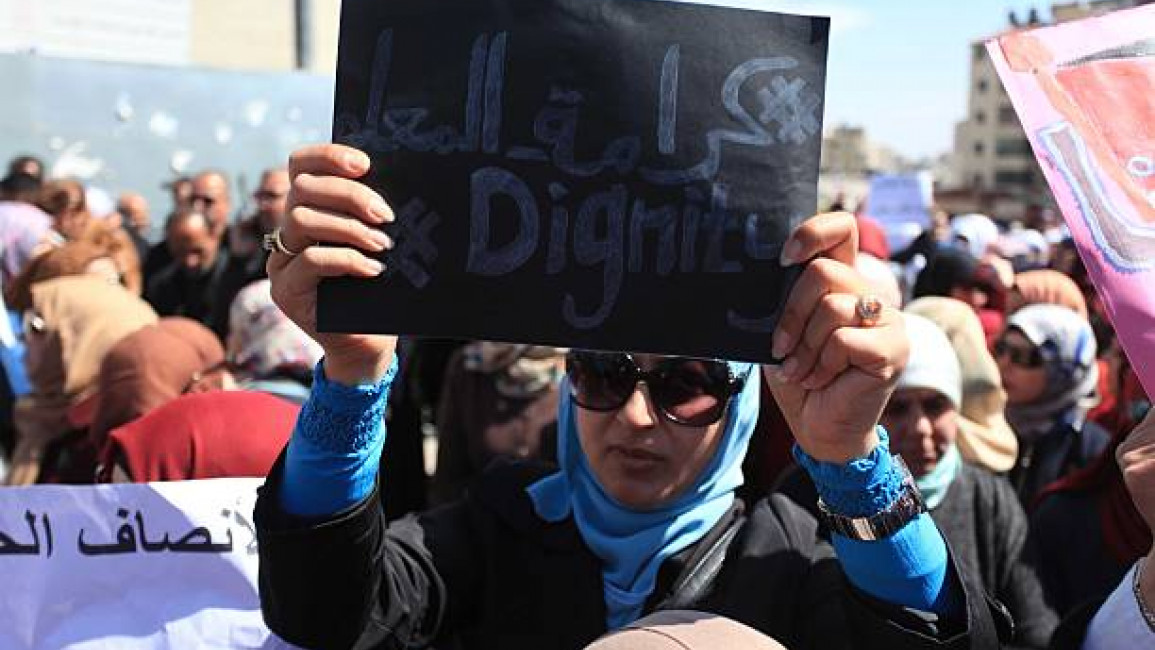Palestinian public teachers on 'largest general strike since 2016' for the 10th day
Palestinian public education teachers in the occupied West Bank continued their general strike for the 10th day in a row on Wednesday, in the largest mass strike by a social movement within the Palestinian territories since 2016, which was also organised by public education teachers.
The officially recognised General Union of Palestine's Teachers had called for a partial strike in late March which lasted three weeks.
The union then reached an agreement with the Palestinian government in mid-April, which was rejected by a large number of teachers, who announced an independent general strike ten days ago.
According to organisers, the strike is being observed in all the West Bank governorates with a participation rate of 97%.
"We rejected the agreement of the union because it did not fulfill the minimum of our legitimate demands," one of the strike organisers, who is also a teacher at a public school in Ramallah, told The New Arab and requested anonymity to speak freely.
"The union is directly attached to the PLO and is loyal to the government, not to the teachers," she said. "The agreement was that we will receive a 10% raise in January 2023, and a 5% raise in 2024, which has nothing to do with our demands."
"We are demanding the restoration of the 'life-expense' raise which has been suspended since 2013 before food prices tripled," the organizer added.
Palestine: Palestinian teachers to strike again todayhttps://t.co/V1yAsbPA3Y pic.twitter.com/sI4sfL87jV
— ATUC (@ArabTradeUnion) October 11, 2016
"We also demand an improvement of our retirement conditions, the definitive hiring of thousands of teachers who have been serving with temporary contracts for years, and most importantly, the reformation of the child and spouse raise," she said.
According to Palestinian law, public servants receive a special increase in their salaries if they have family members who depend on them economically. In the case of women, they have to provide additional proof that they are the main provider for their families.
"Each year, I have to spend a full day at the court filling a form to ask for my children's raise, then I have to go with two witnesses to the personal status religious court and prove that I am a widow and am the sole provider for my three children, all to receive a 20 shekels (less than 7 US dollars) per child," she pointed out.
"The response might vary"
On Sunday, the spokesperson for the Palestinian ministry of education, Tharwat Zeid, told Palestinian media that "it is the right of students to take classes and finish their academic year correctly", calling upon teachers "to resume their classes and fulfill their sacred message of education."
Zeid added that the Palestinian government's response to the strike "could vary according to the situation on the ground, but all scenarios are possible."
Last week, the ministry of education had discounted a day's discount on teachers' salaries, in response to the strike.
"We know that the government's retribution comes later," said the organiser. "We saw it after the 2016 general strike, which is why we don't want to appear in the media with our real names today."
#Palestinian #teachers' #strike marks major rift between public and PA: https://t.co/KcJZWvy6ce via @Mulder_Em pic.twitter.com/9PbKZSpbXI
— Al-Shabaka الشبكة (@AlShabaka) March 13, 2016
In 2016, Palestinian public education teachers' strike lasted four weeks and included more than 50,000 teachers from all the occupied West Bank governorates. The strike ended after Palestinian president Mahmoud Abbas promised in a televised speech that the teachers' demands will be met.
"But what happened next is that the government began to put the teachers who took part in the strike into forced early retirement, some of whom were as young as 31," Issam Abdeen, a human rights lawyer who advised the strikers at the time, told The New Arab.
"The organizers and those who were in public were the first to be put into forced retirement, which represented an additional blow to their movement, and added to the failure of the strike," Abdeen added.
"It is very difficult for any social movement to organize in Palestine lately, especially after the executive branch of the Palestinian government tightened its grip on courts and on civil society," he noted.
"Our own union"
"This is why we are also demanding the right to form our own, independent union," asserted the strike organiser. "Currently, we organize through social media platforms in a horizontal way, which means that there is no leader on whom the government can put pressure, but they have to deal with all of us collectively."
"We have the papers for our independent union ready since 2016, and this time we want to have it fully legalised," she added.
Organisers deny having had any negotiations with the Palestinian government and stress that the strike can continue for months to come.



